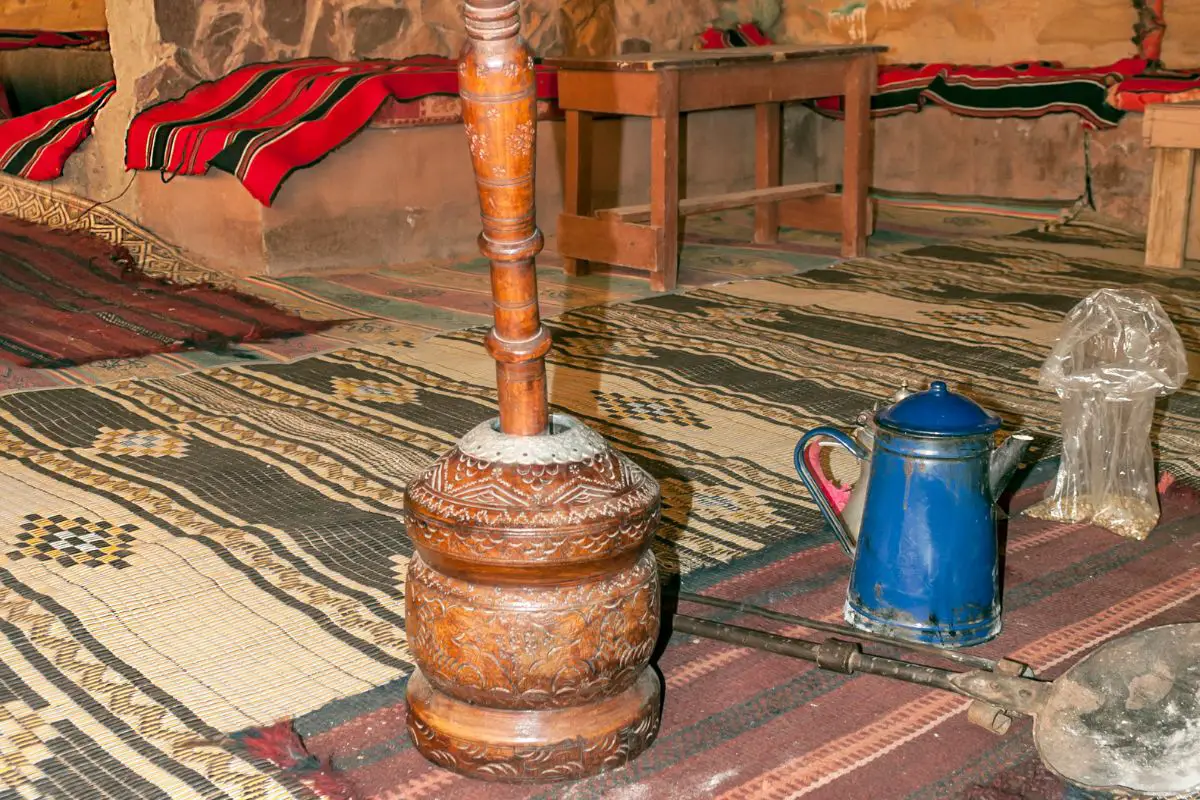Dive into the historical and spiritual connection between coffee and Sufism in this article, which explores the origins of coffee in Sufi culture, its symbolism, and its role in various rituals and practices. Discover how Yemen became the birthplace of coffee in Sufism, and how trade and migration helped spread the beverage throughout the mystical Islamic tradition. Learn about the symbolism of coffee as spiritual fuel, a sign of hospitality, and a social unifier. The article also discusses the influence of Sufi coffeehouses on society and culture, and how modern Sufi orders preserve and adapt coffee traditions in contemporary contexts.

Historical Origins of Coffee in Sufism
The Discovery of Coffee Beans and its Significance for Sufis
The origin of coffee beans traces back to Ethiopia, where they were discovered by a goat herder named Kaldi in the 9th century. Kaldi noticed the energizing effect of coffee beans on his goats, who became increasingly active after consuming them. The news of this remarkable discovery reached Sufi mystics who were constantly seeking ways to enhance their spiritual practice. Sufis began using coffee beans to stay awake during long hours of meditation and prayer.
Yemen: The Birthplace of Coffee in Sufism
Coffee cultivation and trade started in Yemen, which made the country the first birthplace of coffee in Sufism. Sufi monasteries in Yemen began cultivating coffee beans as early as the 15th century. They quickly realized the spiritual and practical benefits of this energizing and invigorating beverage. Coffee became an integral part of Sufi rituals, enabling worshipers to stay alert and focused during their extended devotions.
Role of Trade and Migration on the Spread of Coffee in Sufi Orders
The rapid expansion of the Ottoman Empire and the ancient trade routes, such as the Silk Road and the Spice Road, played a significant role in spreading coffee consumption and cultivation across the Islamic world. Merchants and traders would carry coffee beans on their voyages, introducing it to new societies and cultures as they went. Additionally, Sufi mystics migrated to different regions, spreading their teachings and influencing various cultures with their rituals and practices, including coffee.
As the demand for coffee grew among Sufi congregations, coffee culture started to emerge in other parts of the Islamic world, such as modern-day Turkey, Iran, and North African countries.
The Symbolism of Coffee in Sufi Culture
Coffee as Spiritual Fuel
In Sufism, coffee is viewed as a spiritual fuel that helps worshipers maintain their focus and concentration during long prayer sessions and meditations. The caffeine content in coffee provides physical and mental stimulation, enabling Sufis to engage in their spiritual practices with heightened alertness and devotion.
Coffee as a Sign of Hospitality and Generosity
Sufi culture places great importance on generosity, hospitality, and sharing with others. Offering coffee to guests and fellow worshipers is a way of demonstrating this generosity and hospitality. This tradition is deeply rooted in Sufi teachings, and coffee has become symbolic of the selfless openness and kindness Sufis seek to embody.
Coffee as a Social Connector and Unifier
In addition to its spiritual significance, coffee serves as a social unifier in Sufi culture. Coffee houses and gatherings are spaces where people from various backgrounds can come together to engage in discussions, debates, and share their experiences. Through the act of sharing coffee, social and cultural barriers can be broken down.
Coffee in Sufi Rituals and Spiritual Practices
Preparation and Consumption of Coffee During Sufi Gatherings
The preparation and serving of coffee during Sufi gatherings are both ritualistic and symbolic. The ceremony usually begins with the brewing of coffee using special methods and utensils. The coffee is then served to guests and fellow worshipers in small, delicate cups, signifying the sharing of blessings and hospitality.
Role of Coffee in Dhikr (Remembrance) and Sama (Listening) Practices
Coffee plays a central role in Dhikr (remembrance) and Sama (listening) practices in Sufism. These rituals involve continuous chanting of God’s name and listening to Sufi music, which can go on for several hours. Coffee is served and consumed during these gatherings to maintain focus and concentration among participants.
Awakening the Inner Self and Invoking Divine Presence
Sufis believe that consuming coffee can awaken the inner self, allowing them to become more receptive to divine guidance and presence. The stimulating effects of coffee help Sufis remain alert and focused during their spiritual practices, facilitating a deeper connection with the divine.
The Influence of Sufi Coffeehouses on Society and Culture
Evolution of Sufi Coffeehouses and their Role in Social Interactions
Sufi coffeehouses emerged in the Islamic world as spaces for social interaction, intellectual discourse, and cultural exchange. They became important centers for discussing religion, philosophy, literature, and poetry, as well as debating contemporary issues. Over time, some Sufi coffeehouses evolved into more than just places for communal coffee consumption, becoming centers for artistic and intellectual expressions.
Coffee and Poetry in Sufi Culture
Sufi coffeehouses have been a significant platform for creative expression since their inception. Poetry recitals were a popular feature of these gatherings, enabling poets to share their work with a wider audience and engage in dialogue and critique. Coffee and poetry became intrinsically linked in Sufi culture, inspiring creativity, thought, and introspection.
Intellectual Discussions and Debates at Sufi Coffeehouses
Sufi coffeehouses functioned as spaces for intellectual discussions and debates on various topics, including spirituality, philosophy, politics, and society. Scholars, poets, and thinkers from diverse backgrounds came together to exchange ideas, challenge perspectives, and stimulate intellectual curiosity, often in the accompaniment of coffee.
Contemporary Reflections on Coffee in Sufi Rituals and Ceremonies

Preserving Coffee Traditions in Modern Sufi Orders
Despite the passage of time and the influence of contemporary culture, many modern Sufi orders continue to preserve and celebrate coffee-related traditions and rituals. These practices act as a way of maintaining connections to the past while adapting to the changing sociocultural landscape.
Adaptation of Coffee Drinking Habits to Contemporary Contexts
The consumption of coffee in Sufi practices and gatherings has evolved to adapt to modern tastes and preferences. While traditional brewing methods are still used in some instances, contemporary coffee preparations and serving styles are also embraced by Sufi communities, reflecting the adaptability and resilience of this ancient spiritual tradition.
Inclusion of Coffee in Art, Music, and Literature Inspired by Sufism
Coffee’s prominence in Sufi history and culture continues to inspire artistic expression in various forms. Many contemporary artists, musicians, and writers incorporate coffee symbolism and themes into their work, reflecting on its influence on Sufi identity and spirituality. This fusion of traditional elements with modern, creative approaches exemplifies the enduring appeal and relevance of coffee in Sufi culture.
FAQs on the Role of Coffee in Sufi Rituals and Ceremonies
How is coffee involved in Sufi rituals and ceremonies?
Coffee plays a significant role in Sufi rituals and ceremonies as it aids in concentration, alertness, and combating fatigue during long hours of spiritual practices and discussions (Kureishi, 2016). Coffee houses also serve as communal spaces for spiritual gatherings.
What is the historical context of coffee in Sufi practices?
The incorporation of coffee in Sufi practices traces back to the 15th century when Sufi mystics began to consume coffee to maintain wakefulness during night-time devotions and dhikr (remembrance of God) (Pendergrast, 2010). It spread throughout the Islamic world, eventually becoming an integral component of Sufi gatherings.
How do Sufis prepare and consume coffee during rituals?
Unsweetened and typically unroasted coffee is the most common preparation for Sufi rituals, brewed in a traditional coffee pot called cezve or ibrik (Ancer, 2016). Sufis either drink it directly or ceremonially pass it amongst themselves to signify brotherhood and communion.
What is the significance of coffee houses to Sufism?
Coffee houses emerged in Islamic society as places for Sufis to congregate for spiritual discussions, music, and poetry recitations (Hato & Schielke, 2014). They served as venues to create camaraderie, share wisdom, and create an environment of spiritual reflection.
Are there specific instances or anecdotes linking coffee and Sufism?
One famous anecdote tells of the Yemeni Sufi scholar, Sheikh al-Dabbagh, discovering coffee when he noticed birds eating coffee berries, remaining lively thereafter (Pendergrast, 2010). Upon trying it himself, he found it facilitated concentration and began serving it at his gatherings.
How is coffee viewed in contemporary Sufi practices?
While modern Sufi orders may have different views on coffee and its use in rituals, many still appreciate its historical significance and maintain its presence as an aid for concentration during long prayer sessions and spiritual practices (Kureishi, 2016). Coffee continues to serve as a symbol of hospitality and community in Sufi culture.
Related article:
The Role of Sufi Mystics in Popularizing Coffee Drinking in Yemen